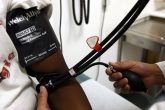The kidneys are two bean shaped organs, each about the size of a fist. They are located just below the rib cage, one on each side of the spine. The kidneys help to filter blood removing unwanted waste products and the extra fluid in the blood. Everyday, the two kidneys filter about 120-150 litres of blood to produce 1-2 litres of urine. Urine flows from the kidneys to the bladder.
Why Are The Kidneys Important?
The kidneys are important because they keep the composition/make-up of the blood stable (This stability is referred to homeostasis). The following are the functions of the kidney
- The kidneys prevent the build-up of waste and extra fluid in the body
- They keep levels of certain chemicals stable (sodium, potassium and phosphate)
- The kidneys make hormones that help: regulate blood pressure, make blood cells and bones stay strong
Kidney Diseases
Kidney disease describes any problems that one may have when their kidneys aren’t functioning properly. These diseases may be minor or severe, but one must take steps to control them.
Symptoms of Kidney Diseases
Kidney disease usually does not have symptoms in the early stages. However, here are a few symptoms associated with kidney diseases:
- Edema: swelling as a result of the kidney’s inability to get rid of extra fluid and salt. Edema can occur in the legs, feet and ankles.
- Appetite loss & weight loss,
- Trouble concentrating,
- Drowsiness or feeling tired,
- Dry skin & darkened skin,
- Muscle cramps,
- Increased or decreased urination,
- Generalized itching & numbness,
- Nausea & vomiting,
- Shortness of breath,
- Chest pain.
Causes of Kidney Disease
- High blood pressure and Diabetes are the two leading causes of kidney diseases in black people. Therefore undiagnosed high blood pressure and diabetes could lead to kidney diseases. Black people suffer from kidney failure at a significantly higher rate than other races (about four times the rate of caucasians). Black people are more likely than caucasians to have high blood pressure and its related kidney problems- even when their blood pressure is mildly elevated.
- Heavy metal poisoning (such as lead poisoning from long-term exposure to petrol, paint & batteries, mercury poisoning in miners and users of skin bleaching creams, as well as mercury containing soaps).
- Congenital causes (condition present at birth).
- Use of expired medications such as tetracycline antibiotic.
- Sickle cells diseases.
- Some traditional herbal medicine.
- Infections (Malaria, skin and throat infections).
- Pesticides used in farming.
How does High Blood Pressure Affect the Kidney?
Blood pressure measures the force of blood pushing outwards on your arterial walls. It is the pressure exerted on the artery walls by circulating blood. High blood pressure can damage blood vessels in the kidneys, as well as other organs of the body, reducing their ability to work properly. When the force of blood flow is high, blood vessels stretch so blood flows more easily. Eventually, this stretching scars and weakens blood vessels throughout the body, including those in the kidneys. If the kidneys’ blood vessels are damaged, they may stop removing wastes and extra fluid from the body. Extra fluid in the blood vessels may then raise blood pressure even more, creating a dangerous cycle.
Complications Associated With Kidney Diseases
- Fluid retention, which could lead to swelling in your arms and legs, high blood pressure, or fluid in your lungs
- Heart attack, heart and blood vessel disease (cardiovascular disease)
- Weak bones and an increased risk of bone fractures
- Anemia
- Decreased sex drive or impotence
- Damage to your brain which can cause difficulty concentrating, personality changes, seizures or stroke
- Decreased immune response, which makes you more vulnerable to infection
- Pericarditis, an inflammation of the sac-like membrane that envelops your heart (pericardium)
- Pregnancy complications that carry risks for the mother and the developing baby
- Kidney Failure – Irreversible damage to your kidneys (end-stage kidney disease), eventually requiring either dialysis or a kidney transplant for survival.
Can kidney disease be treated?
In the very early stages, kidney disease may need little or no treatment. However, kidney disease also raises your risk of heart disease and stroke, and your doctor will want to ensure that this risk is as low as it can be.
Controlling your blood pressure is an important way to reduce kidney disease, and to reduce your risk of heart disease and stroke. Your doctor will want to ensure that your blood pressure is lower than 140/90 mmHg, and in some cases as low as 130/80 mmHg
Certain high blood pressure medications are best for people who have developed kidney disease because they help protect the kidneys against further damage. If these medicines do not lower your blood pressure enough then other blood pressure medicines can be used.
If you have diabetes as well as high blood pressure, it is extremely important to keep this controlled. Diabetes can cause serious damage to your kidneys if it is not treated properly.
What is Dialysis?
Dialysis is a treatment that does some of the things done by healthy kidneys. It is needed when you have kidney failure and your own kidneys can no longer take care of your body’s needs. When your kidneys fail, dialysis keeps your body in balance by:
- Removing waste, salt and extra water to prevent them from building up in the body,
- Keeping a safe level of certain chemicals in your blood
- Helping to control blood pressure
Preventing Kidney Disease
A few lifestyle changes could be made to prevent kidney diseases. These changes includes:
- Eat a better diet, including reducing salt. – eat less fat and saturated fat as well as more fresh fruits, vegetables and whole-grain foods.
- Enjoy regular physical activity – 30 minutes a day
- Maintain a healthy weight – Being overweight increases your risk of developing high blood pressure.
- Manage stress – Don’t let stress build up. The chemicals your body makes in response to stress make your heart beat harder and faster and your blood vessels tighten. All this makes blood pressure higher
- Avoid tobacco smoke & limit alcohol.
- Comply with medication prescriptions.
Author Zaidat Ibrahim
Zaidat gained her Bachelors Degree from a U.S College and she currently works at  Massachusetts General Hospital (MGH) in Boston. She also works as an Editor for Opportunity Desk and volunteers for several organizations through the UNV. She is known for her hard work, commitment and most of all, her beaming smiles.
Massachusetts General Hospital (MGH) in Boston. She also works as an Editor for Opportunity Desk and volunteers for several organizations through the UNV. She is known for her hard work, commitment and most of all, her beaming smiles.



Preventing Kidney disease in children « The HealthZone
[…] The Kidneys: Know, Understand & Care For Your Kidneys […]